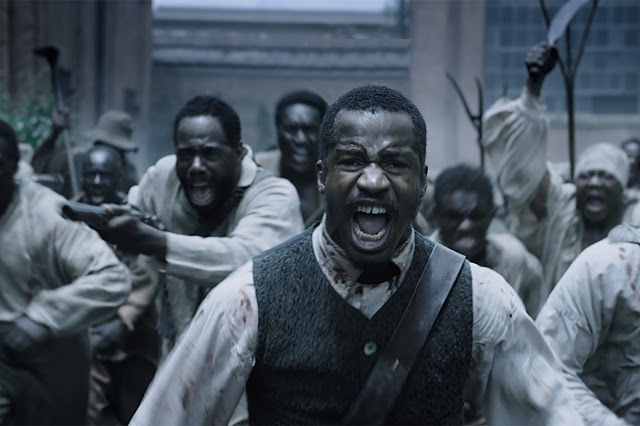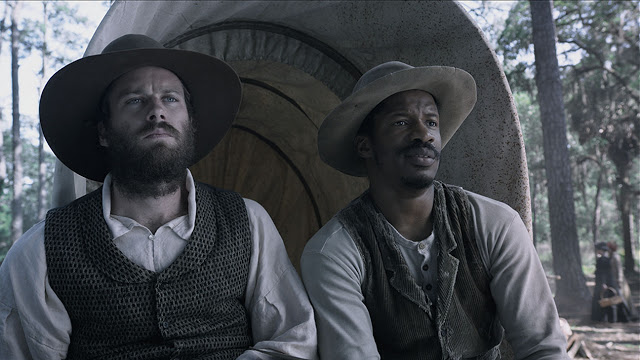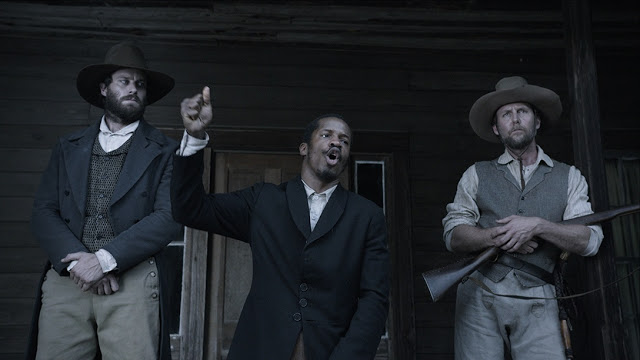No movie exists entirely within its own bubble, but the clamor surrounding The Birth of a Nation is so loud, it’s threatened to silence the actual film. When it premiered in January at the Sundance Film Festival, The Birth of a Nation was hailed not only as a good movie—it won both the Grand Jury Prize and the Audience Award—but as a timely and potent corrective to the monochrome of the Academy Awards, which were squirming through the second consecutive year of #OscarsSoWhite. But in August, reports surfaced that Nate Parker, the film’s writer-director as well as its star, had been charged with rape in 1999 along with Jean McGianni Celestin, who shares a story credit with Parker. In 2001, Parker was acquitted (Celestin was convicted, but the verdict was overturned on appeal); then, in 2012, his accuser killed herself. This tragedy—combined with the fact that the film features a rape whose accuracy has been questioned—ignited a firestorm that has engulfed the picture, resulting in boycotts, short-circuited interviews, and a marketing campaign that could charitably be described as tentative. Both the breadth and the volume of the rhetoric surrounding The Birth of a Nation‘s release make it challenging to look past the movie’s context to see its content.
Yet here we are. By which I mean, my job as a film critic is not to analyze The Birth of a Nation’s Best Picture prospects, nor is it to reconcile Nate Parker the person with Nate Parker the artist. (It is certainly not to determine the validity of the sexual assault allegations against Parker or to assess the prospect of causation with the alleged victim’s suicide, tasks for which I am wholly unqualified.) It is instead to evaluate this movie as, well, a movie. And on that score, perhaps the most interesting thing about The Birth of a Nation is how ordinary it is. What we have here is a prototypical biopic, alternately stimulating and stultifying. You’ve seen movies like this before, which means you are much more likely to remember this one for what it represents than for what it contains.
This does not mean that The Birth of a Nation is meaningless; it has value, both as a sober period piece and as a contemporary political document. Parker, who has been acting for more than a decade (some of his better-known credits include The Great Debaters, Red Tails, and Beyond the Lights), is making his first feature, and his inexperience often shows, but he is clearly operating with conviction (he purportedly refused to continue acting in other pictures until this movie was made).
This is crucial, because as a storyteller, Parker expresses minimal interest in creativity or risk. The Birth of a Nation tells the story of Nat Turner, the slave who led a brief and bloody rebellion in 1831, and it proceeds exactly as you would expect. Following a muddy and muddled prologue, its opening act finds Turner as a young boy (played by Tony Espinosa) living in servitude on a Virginia plantation. His facility with letters earns him special treatment from the household’s matriarch, and he verses himself in the Bible. This early passage is designed to establish Turner’s deep-seated theism and to lay the foundation for his discontent, but it is unnecessarily lengthy, and Espinosa’s affectless performance keeps things too remote. (It doesn’t help that this fraught territory between slave owners’ benevolence and their brutality was explored more effectively in the recent television remake of Alex Haley’s Roots.)
Eventually, The Birth of a Nation flashes forward to Turner as an adult (now played by Parker), at which point it finally begins to develop some momentum. The movie’s greatest source of intrigue and tension lies in the complicated relationship that Turner has with Samuel (Armie Hammer, solid beneath the bushy beard), the owner of both the plantation and most of the people on it. Once you discount the fact that he thoughtlessly treats people as property, Samuel initially strikes you as a decent fellow, and his half-friendly rapport with Turner suggests a dynamic between manager and employee more so than master and servant. When Turner encourages Samuel to buy a particularly attractive female slave at auction, Samuel consents with a resigned weariness that shows he values Turner’s opinion and intelligence, even if he views him as biologically inferior.
As it turns out, Samuel has more tangible, fiscal reasons to appreciate the man who drives his carriage and picks his cotton. Hearing of Turner’s fluency with the Bible, a local reverend (Mark Boone Jr., charmingly disgusting) encourages Samuel to rent him out to various area plantations, where he can preach to their slaves the sacred gospel of obedience. The most compelling stretch of The Birth of a Nation functions as a sort of disturbing road movie, following Turner as he visits other farmhouses and turns a blind eye to his fellow slaves’ degradation, instead exhorting them to simply accept their suffering. Parker is not an especially emotive actor, but in these scenes, he nicely articulates Turner’s mounting conflict and self-loathing. Slavery is a grotesque practice, so in furthering it via the word of the Lord, is he not abetting the Devil?
As Turner wrestles with his increasingly restless conscience, The Birth of a Nation observes the evils of slavery with commendable matter-of-factness. The obvious point of comparison here is 12 Years a Slave, Steve McQueen’s wrenching portrait of the casual terror that the institution of slavery inflicted upon one person and, by extension, an entire people. Yet Parker lacks McQueen’s visual flair, and with the exception of one carelessly horrific sequence—when an owner breaks a slave’s hunger strike by knocking out his teeth before jamming a funnel down his throat—the movie’s depictions of the antebellum South fail to hit as hard as they should.
More troubling is the film’s thinness of characterization, particularly when it comes to women. Remember that comely slave who caught Turner’s eye? That’s Cherry (Aja Naomi King), the volatile slave who shortly becomes Turner’s passive wife. The Birth of a Nation features some cursory scenes of cute courtship, but it treats Cherry less as an individual than as a collection of symbols. She is, at various points in the narrative, either a saint or a victim, unlocking Turner’s capacity for love or activating his simmering sense of rage. The movie’s catalyzing incident—in which Cherry is raped, thereby inspiring Turner to take violent action—may perturb viewers familiar with the allegations against Parker, but even within the context of the film itself, it is reductive.
These are real flaws, but The Birth of a Nation remains a provocative experience, not least when placed against the backdrop of race relations in 2016 America. It would hardly seem controversial to contend that our current social climate is beset by divisions, whether between whites and blacks, cops and civilians, or haves and have-nots. The Birth of a Nation—Parker has intentionally co-opted the title from D.W. Griffith’s half-storied, half-infamous 1915 classic, which arguably invented modern film grammar while also venerating the Ku Klux Klan—does not attempt to solve all of society’s problems, but it does speak powerfully to the atmosphere of injustice and discrimination that pervades the modern-day U.S.A. And while Parker treats Turner’s ultimate rebellion as an act of valiant heroism—its final act bears a strong similarity to Braveheart, although (and speaking of separating art from artist) Parker’s direction is less vigorously accomplished than Mel Gibson’s—he is not issuing an outright call to arms. Instead, he is forcefully reminding us that our present schisms are rooted in a complex system where people were bought and sold, an economy that operated in this country for centuries.
The Birth of a Nation is more important than it is good; its lackluster filmmaking and boilerplate screenwriting should not be easily papered over. But it stands tall as an example of how cinema can allow artists to address society’s ills as well as to serve as an escape from them. In other words, black lives matter, and black movies do, too.
Jeremy Beck is the editor-in-chief of MovieManifesto. He watches more movies and television than he probably should.



